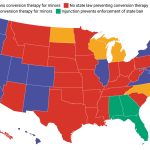“Merry Christmas, Johnny Rose” demonstrates how the omnipresence of Christmas has offered American Jews a variety of non-exclusive options for handling the holiday season: Ignore or distance themselves from Christmas, embrace (at least) its more secular aspects and bond with other non-Christian groups who may also feel like outsiders.
The Conversation
Plastics Trashing Oceans Have Their Biggest Source in US
On a per capita basis, the U.S. produces an order of magnitude more plastic waste than China – a nation often vilified over pollution-related issues.And only a small fraction of plastic in U.S. household waste streams is recycled.
School Shootings Are At a Record High This Year. They Can Be Prevented.
The shooting at Oxford High School was one of 222 school shootings in 2021, an all-time high, according to the Center for Homeland Defense and Security’s K-12 School Shooting Database.
Supreme Court Will Eviscerate Roe v. Wade But Signals Split on What Comes Next
The Supreme Court justices signaled a major shift on abortion law in arguments on a Missouri case today but the six conservative justices who hold the majority in the highest court seemed divided: Would they overturn the core right to abortion entirely or would they allow abortion to be limited by the states to the early stages of pregnancy?
Anti-CRT Lawmakers Are Passing Pro-CRT Laws
Anti-CRT messaging has emerged as a signature – and potent – GOP political talking point. But while Republicans introduced 54 CRT-related bills across 24 states, most of these bills – if you take seriously their actual text – call for more CRT, not less.
Millions of Americans Are Struggling to Pay Their Water Bills. Time for an Aid Program.
A 2019 survey found that U.S. households in the bottom fifth of the economy spent 12.4% of their disposable income on water and sewer services. News reports suggest that for low-income households, this burden has increased during the pandemic.
‘Let’s Go Brandon’ and the Linguistic Jiujitsu of American Politics
The enthusiastic adoption of the phrase by President Joe Biden’s detractors suggests that “Let’s go Brandon” is best described as a minced oath. These are euphemisms used in place of a taboo or blasphemous expression. Such oaths have a long history in English. Some Biden supporters are turning the phrase into one of support for him. And as a variant, some of the president’s supporters have begun to employ, “Thank you Brandon.”
How the Omicron Variant Was Found and What We Know So Far
South Africa has several laboratories that can grow and study the actual virus and discover how far antibodies, formed in response to vaccination or previous infection, are able to neutralise the new virus. This data will allow scientists to to characterize the new virus and develop counter strategies.
The More Telling Months After the First Thanksgiving
What happened four months after the first Thanksgiving, starting in March 1622 about 600 miles south of Plymouth, is far more reflective of the country’s origins – a story not of peaceful coexistence but of distrust, displacement and repression.
The Personhood Argument Gestating Over Abortion
On Dec. 1, 2021, the court will hear a case many believe will force the conservative justices — who now command a majority of the court — to decide if they will strike down Roe v. Wade or uphold the long-standing precedent. But a third path could focus a ruling on a more neglected aspect of the ruling in Roe — the court’s understanding of the facts of fetal personhood.
Waukesha, Wisconsin, and the Era of Vehicles as Weapon of Mass Killing
Cars, SUVs and trucks can be an efficient means of mass killing such as the SUV attack of a Christmas parade in Waukesha, Wisconsin, and one that can be virtually impossible to prepare against. Furthermore, it is becoming harder to prosecute the driver involved in such fatalities in some states.
Conversion Therapy Is Lethal Bunk, But Fewer Than Half the States Ban It
Many LGBTQ youth live in states, Florida among them, that have no ban in place protecting them from conversion therapy – a practice that the scientific community has long since shunned, and that nearly doubles the incidence of suicide among gay, lesbian and bisexual people victimized by the fraud.
No Such Things as ‘Smart’ Missiles That Avoid Civilians
The development of more precise missiles and guided bombs does not automatically mean a reduction in civilian deaths. For one thing, “precision” is not about protecting civilians so much as making these weapons “more lethal”.
Rittenhouse Verdict Flies in the Face of Legal Standards for Self-Defense
In delivering its verdict, a Wisconsin jury decided that Rittenhouse’s conduct was justified, even though the prosecution argued that he provoked the violent encounter and, therefore, should not be able to find refuge in the self-defense doctrine.
These Foods You Love Are as Addictive and Worse Than Cigarettes and Booze Combined
For many, the desire to change what they eat is triggered by concerns about potentially life-threatening health conditions, like diabetes and heart disease. The impact of diet on health is not a small problem, and pose a greater risk to human health than unsafe sex and alcohol, drug and tobacco use combined.
Online Anonymity: ‘Stable Pseudonyms’ Create a More Civil Environment than Real User Names
Research suggests that anonymity – under certain conditions – can actually make for more civil and productive online discussion. This surprising result came out of a study looking at the deliberative quality of comments on online news articles under a range of different identity rules.
Journalism in Middle America Got Communities Through the Pandemic
How did so many local news organizations – especially newspapers – manage to survive the pandemic? Weeklies beefed up their daily online news coverage, business models were blown up and existing rationales for why journalism matters became more than theoretical to rural journalists.
The Ancient History of Adding Insult to Injury
From James Bond to the Terminator, quips over someone’s demolition literally add insult to injury, defaming the victim immediately after their demise, emblazoning the death with a caption, like a perverse eulogy. It’s a long tradition.
Building More Homes Isn’t Affordable Housing For Those Who Need It Most
There is not a single state, metropolitan area or county in which a full-time minimum wage worker can afford the “fair market rent” for a two-bedroom home, as designated by the U.S. Department of Housing and Urban Development. Even the smallest, most basic housing units are often unaffordable to people with very low incomes.
Transgender and Gender Diverse Teens: How to Talk To and Support Them
Transgender youth have been around long before the word transgender has. Yet today, transgender teens are increasingly visible in society. For parents and caregivers, knowing how to talk to their children about gender can present a steep learning curve.
If You’re a Sucky Employer, Don’t Be Surprised Your Workers Are Quitting
The U.S. labor market is expected to become far more diverse going forward in terms of gender, ethnicity and age. Thus, employers that cannot provide greater flexibility and variety in their working environment will struggle to attract and retain workers.
The Federal Poverty Line Is Out of Step With the Way The Other Half Lives
In 2021, according to the National Low Income Housing Coalition, a worker needs to earn $20.40 per hour to be able to afford a modest one-bedroom apartment anywhere in the country. That’s an annual salary of $40,800 – more than twice what Brookings refers to as the median wage for low-wage work.
School Surveillance of Students Through Laptops May Be Doing More Harm Than Good
Student surveillance is taking place – at taxpayer expense – in cities and school communities throughout the United States. In one large district, three-quarters of incidents reported – that is, cases where the system flagged students’ online activity – took place outside school hours.
U.S. Military Is Single-Largest Polluter in the World. And Hides It.
If the US military were a country, its fuel usage alone would make it the 47th largest emitter of greenhouse gases in the world, sitting between Peru and Portugal. In other words, the US military is a more consequential climate actor than many of the industrialized countries gathered at the COP26 summit in Glasgow.
Nicaragua’s Ortega Helped Overthrow a Dictator. Now He Is One.
Ortega and his wife Rosario Murillo have managed to cling on to power. There are many reasons for their political survival, including the opposition’s fragmentation, a repressive state apparatus, and a lack of international pressure. What is too often overlooked, though, is that for many Nicaraguans, the FSLN remains the only political party that represents the interests of the poor.
What Greta Thunberg and Sweden Teach Us About Youth Empowerment
Children’s participation in social and political issues has been facilitated by specific notions of childhood in the Nordic countries. The idea of the autonomous and competent child has been described by researchers as a characteristic feature of the “Nordic model of childhood”, influencing child rearing and public policy for several decades. While the elements of this model are not unique to the region, the notion has had a lasting impact upon several generations of Swedish children, teaching them the value of independence and to make their voices heard.
How to Spend $1 Trillion on Infrastructure
The bill is the largest investment in the nation’s infrastructure in decades. It puts about US$240 billion toward building or rebuilding roads, bridges, public transit, airports and railways. More than $150 billion is slated for projects that address climate change, like building electric vehicle charging stations, upgrading energy grids and production to work better with renewables, and making public transit more environmentally sustainable.
Today’s Flooding Is No Fluke. Sea Levels Are Rising.
Climate change, fueled by fossil fuel use and other human activities, is causing average global surface temperatures to rise. This is leading the ocean to absorb more heat than it did before the industrial era began. That, in turn, is causing ocean thermal expansion.
Lessons from the Virginia Governor’s Race
Many voters wanted to hear both candidates’ views on “kitchen table” issues – such as expanding job opportunities, ensuring public safety, and reforming education – in the closing weeks before the election. But that wasn’t always what voters got. Instead, they were often presented not with the issues, but with heavyweight political endorsements.
LGBTQ Life Is Flourishing in Small-Town America
LGBTQ people in rural places and small towns are often ignored in the larger conversation surrounding queer life and culture. Even with these omissions, Pride celebrations in those locations are sweeping the nation (including Palm Coast), often encountering initial resistance.
Facebook’s Misinformation Problem
Leaked internal documents suggest Facebook – which recently renamed itself Meta – is doing far worse than it claims at minimizing Covid-19 vaccine misinformation on the Facebook social media platform.
Covid’s Threat to the Already Shaky Status of Arts Education in Schools
In two studies from 2007 to 2008, schools indicated that they had cut an average of 145 minutes per week across the nontested subjects, lunch and recess. Where visual art and music were cut back, it was for an average of 57 minutes per week.
K-Pop Is Trending. So Is Anti-Asian Bigotry.
There is no doubt that the representation of Asian people in Hollywood has improved. The pandemic has led to a disturbing rise in anti-Asian racism and hate crimes.
School Choice: Why You Should Vaccinate Your Kids 5 to 11
The FDA authorization comes after months of pediatric clinical trial investigation involving about 4,500 children ages 5 to 11. Pfizer released new data on Oct. 22, 2021, stating that its vaccine is almost 91% effective at preventing COVID-19 in that age group, with similar tolerability and antibody responses to that seen in older age groups.
Save the Tatas. Sure. But Do a Better Job Focusing on Women at Stage 4, Too.
Breast cancer awareness campaigns can do a better job supporting women who’ve received a stage 4 diagnosis, instead of focusing only on early detection and ‘beating cancer.’
Climate Change: What Big Oil Knew and When It Knew It
The oil industry’s own words show companies knew about the climate change risk fossil fuels posed long before most of the rest of the world. Here’s what corporate documents from the past six decades show.
Fall Colors Aren’t What They Used To Be. Blame Climate Change.
Warming has caused a delay in peak colors for much of the East, ranging from a few days in Pennsylvania to as much as two weeks in New England. It’s not yet known whether this delay is making fall colors less intense or shorter-lasting.
Glasgow Climate Summit: What to Watch For
Glasgow sits proudly on the banks of the river Clyde, once the heart of Scotland’s industrial glory and now a launchpad for its green energy transition. It’s a fitting host for the United Nations’ climate conference, COP26, where world leaders will be discussing how their countries will reduce the greenhouse gas emissions that are driving climate change.
What’s Behind ADHD
ADHD affects more than 6 million U.S. children. People who have ADHD develop symptoms by age 12, and it usually continues into adolescence and young adulthood. The condition can affect people throughout their whole life.
Remember When Parents Were Fine With Sweeping Vaccine Mandates?
By James Colgrove The ongoing battles over Covid-19 vaccination in the U.S. are likely to get more heated when the Food and Drug Administration authorizes emergency use of a vaccine for children ages 5 to 11, expected later this fall. California has announced it will require the vaccine for elementary school attendance once it receives full FDA […]
Time to Stop Worrying About Children’s Screen Time? Not So Fast.
We still need to be wary of health consequences, despite the absence of strong links between screen time and children’s health. The researchers–the study involved almost 12,000 nine-to-ten-year-olds from 24 diverse sites across the United States–suggested screen time was not a direct cause of depression or anxiety and was linked to improved peer relations, but their findings came with caveats.
Trump Wants His National Archives Papers Censored. Laws May Not Let Him.
At the center of the current conflict between Trump and the congressional committee is the status of presidential papers: Are they public or private? If they’re in the National Archives, they’re not necessarily private. Ex-presidents do not have the ability as former presidents to assert blanket executive privilege.
The Founders Didn’t Believe Your Sacred Freedom Means You Can Do Whatever the Hell You Want
The founders agreed on one principle: They were unrelenting on the notion that circumstances often emerge that require public officials to pass acts that abridge individual freedoms. Even George Washington forced his troops to be vaccinated.
Cities Aren’t Adapting to Climate Change Quickly Enough
the pace of climate change is accelerating much more rapidly than urban areas are taking steps to adapt to it. Failure to adapt urban areas to climate change will put millions of people at risk.
Trump Antidote: How Anti-Celebrity Politicians Can Thrive in a Starstruck World
Amid the Trumps and Johnsons of the world, can “traditional” politicians still compete for power? This is where the anti-celebrity politician comes in. Dressing and behaving inconspicuously, and ostensibly lacking media savviness, the anti-celebrity politician embodies the opposite qualities to celebrity stardom. He or she avoids the limelight, and flourishes when fatigue with celebrity figures sets in.
When Students Attack Teachers
Interviews with 50 teachers from urban and suburban high schools who were threatened or attacked by a student suggest that in light of the constant threat of violence against schoolteachers, the adequacy of current security measures – or lack thereof – are ripe for review.
Antarctica’s Ice Sheet Collapse Is Still Preventable. Barely.
In West Antarctica, the interior of the ice sheet sits atop bedrock that lies well below sea level. As the Southern Ocean warms, scientists are concerned the ice sheet will continue to retreat, potentially raising sea level by several meters.
Bisexual Superman: A Subtext Finally, Happily Out of the Closet
Son of Kal-El will be out this November, and will feature Jon sharing a kiss with friend and online journalist Jay Nakamura. Apart from proving Superman has always had a thing for reporters, Jon expressing his sexuality is a watershed moment in the venerable franchise.
Do Unbiased Jurors Exist in Social Media Age Anymore?
It’s a fundamental question for this era: Is it possible to find unbiased citizens to serve on a jury in high-profile cases during an age of ubiquitous social media? The dilemma facing the Supreme Court is how prescriptive they want the voir dire process to be. It could issue an opinion requiring lower courts to ask jurors more penetrating questions about their exposure to media accounts in high-profile cases.
No, Immigrants Don’t Reduce Natives’ Wages
Nobel Prize winner David Card combined a clever technique with data generated by a unique historical event to credibly answer how large-scale immigration from a poor country affects the wages of native-born citizens. It doesn’t hurt those wages.




















































